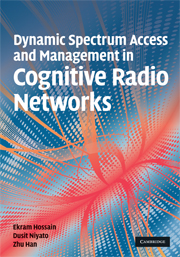Book contents
- Frontmatter
- Contents
- Preface
- Part I Introduction
- Part II Techniques for design, analysis, and optimization of dynamic spectrum access and management
- 3 Signal processing techniques
- 4 Optimization techniques
- 5 Game theory
- 6 Intelligent algorithms
- Part III Dynamic spectrum access and management
- References
- Index
6 - Intelligent algorithms
from Part II - Techniques for design, analysis, and optimization of dynamic spectrum access and management
Published online by Cambridge University Press: 26 February 2010
- Frontmatter
- Contents
- Preface
- Part I Introduction
- Part II Techniques for design, analysis, and optimization of dynamic spectrum access and management
- 3 Signal processing techniques
- 4 Optimization techniques
- 5 Game theory
- 6 Intelligent algorithms
- Part III Dynamic spectrum access and management
- References
- Index
Summary
Cognitive radios need to have the ability to learn and adapt their wireless transmission according to the ambient radio environment. Intelligent algorithms such as those based on machine learning, genetic algorithms, and fuzzy control are therefore key to the implementation of cognitive radio technology. In general, these algorithms are used to observe the state of the wireless environment and build knowledge about the environment. This knowledge is used by a cognitive radio to adapt its decision on spectrum access. For example, a cognitive radio (i.e. an unlicensed user) can observe the transmission activity of primary (i.e. licensed) users on different channels. This enables the cognitive radio to build knowledge about the licensed users activity on each channel (e.g. how often and how long the channel will be occupied by the licensed user). This knowledge is then used by the cognitive radio to decide which channel to access so that the desired performance objectives can be achieved (e.g. throughput is maximized while the interference or collision caused to the licensed users is maintained below the target level).
Applications of different learning and intelligent algorithms to a cognitive radio system were summarized in [2] (Figure 6.1). These algorithms can be used for learning/reasoning and decision/adaptation in cognitive radio systems. In this chapter, three major categories of intelligent algorithm, namely, machine learning, genetic algorithm, and fuzzy logic based algorithms, are discussed. Machine learning can be divided into three categories: supervised learning, unsupervised learning, and reinforcement learning. The related algorithms and their applications to cognitive radio are discussed in Sections 6.1–6.3.
- Type
- Chapter
- Information
- Publisher: Cambridge University PressPrint publication year: 2009



